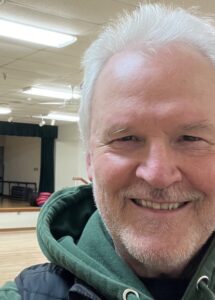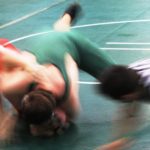Inherited talent comes with that one big question: what to do?
This is part of the Nature vs Nurture debate.
If you’re born with the ability to do something well, how can you do it better? And who recognizes inherited talent besides helicopter parents?
Teachers. That’s the answer, teachers. They notice these things.
I went to a teacher/parent meeting for my oldest when he was in third or fourth grade. The room had a corner display for math showing the kids names on the walls at different levels based on test scores.
I noticed it walking into the meeting and quick-scanned it for my kid’s name. It wasn’t there, so I steeled myself for the news that my kid was struggling in math.
Made sense to me because it seems normal to struggle with math, algebra, algebra II, calculus. Am I missing anything? Geometry?
My math struggle landed me in college math class for non-majors, in other words math morons, and I was even worse than that. I had to cheat off of idiot football players, or find a different science class, to fulfill major requirements.
So I sat with my wife and the teacher waiting for the math news, but it didn’t come. Apparently I had a well adjusted little boy who was doing well in school and played with others.
I brought up the corner math ladder before we finished and asked why my kid’s name didn’t make the wall.
Teacher said I wasn’t looking in the right place. Just like a teacher, right? I’m looking where he said look then he tells me I’m looking in the wrong place.
What sort for educational sorcery was this?
Look up he said, so I looked up and silently read the names at the top of the scale. Nope, didn’t see my kid’s name.
I figured the teacher was cushioning the academic blow I saw coming: my kid might as well drop out now and go work in the mines, the mills, the factories and fisheries and farms, a job of simple repetition, the sort of jobs America was built on.
“Look up,” teacher said.
I didn’t say, “I’m looking, pal, I’ve been looking since I walked in here. I’m still looking and my kid’s name is not on the corner display for scholarship, so let’s get it over with, give me the hard news. My kid can’t count? Where oh where did I go wrong? Mr. Kraus was right when he said toot toot tootsie good-bye.”
“Look higher,” teacher said, as if I couldn’t see the tree for the forest. I didn’t take him for a Zen master.
I stared at the collection of names crawling up the walls in the corner, still didn’t see my kid’s name, and shrugged to the teacher.
“Am I missing something?” I asked.
I’m usually missing something, so I wouldn’t be surprised if I didn’t see what I was supposed to see while I followed his directions on where to look. If the question ever comes about about reading instructions and following directions, always say you do for sake of sharing common goals.
By now I was staring at the wall like I stare into the refrigerator looking for the milk carton I just took out. ‘I know it’s in here someplace.’ I planned on staring at the wall until teacher gave more instruction, like you do in the Army.
He noticed my laser-like focus.
“Look at the ceiling,” he said.
I nodded, turned to give him a smile that showed I heard and understood what he said and ‘why the heck didn’t you say that in the first place. ‘Look at the ceiling’ isn’t beyond my abilities.’
I looked at the ceiling and saw two names, my kid and a girl’s name.
“There he is,” I said, noticing the faint line connecting the name tags to the other names below.
“I’m using the same measure for everyone on testing, and they get to see themselves improve,” he said.
“And those two have separated from the pack. Does anyone say anything?” I asked, listening for bully talk about the smart kids.
“The other third grade teachers and I have classroom competitions and everyone works together to raise us higher than them. It’s a supportive exercise for everybody. The two on the ceiling are working at a higher level, as you can see,” teacher said.
He was nurturing math skills and my kid didn’t inherit math-phobia. Win win? Did the kid smoke his old man with fourth grade math? Maybe it was fifth grade.
What To Do With Inherited Talent
For reference to what I’m going to say, I’m writing from the view of a sixty-five year old man, a mid-boom baby boomer, a mid-century modern American white male who went to a small town grade school in the Sixties, high school in the earliest Seventies, and college in the 70’s, 80’s, and 90’s.
I’m either an enthusiastic drop-out, or a persistent learner.
When you’re growing up in the hectic mix of school, sports, and family, life can be a blur in the rearview mirror. You know you did it, but you’re not sure how.
Being a parent clears things up.
I saw my kids through the same school district from kindergarten through graduation, met every teacher, conveyed the ‘involved-Dad-vibe.’ I met their classmates and their parents either in the neighborhood, school activities, or youth league teams I coached.
I say this because I witnessed what I’m calling inherited talent from a distance instead of close-up as a kid.
In high school I saw a kid pitch who threw like a left handed Juan Marichal. He had pro scouts come to games. He wasn’t like anything I’d ever seen before or since. Tim Lincecum of the SF Giants has been the closest. He was a great talent, but all I thought when I saw him was ‘I’m glad I don’t have to stand in that batter’s box.’
As a parent I saw a different angle. Teachers and coaches connect with kids, some more than others. Rowdy kids with academic and athletic promise don’t always get the right treatment at the right time.
When that kid goes up against an adult with an intent to ‘break and re-build’ before helping them grow, something’s going to give. If a flawed coach gives flawed instruction, the kid suffers.
In another way, if you start the organic chemistry sequence in state college summer school before transferring to the Berkeley labs for their version of the medical school weeder class, you may struggle.
Millennial Message To Their New Generation
Seeing inherited talent grow is one of the joys of aging.
I always claim everything positive in my kids for my side of the family tree, my wife does the same. The kids decide.
Is that how they will run their houses and their kids?
Smart kids with smart kids are the future, and we get to be a part of it.
We’ll be around with more mask wearing, more hand washing, more social distancing.



